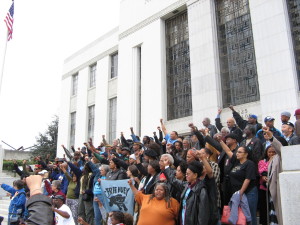By now, all my readers will have heard of the protests on campuses across the country, aimed at some vague “white male privilege,” or aggressions so minuscule that they can only be registered on a leftist Geiger counter – subatomic particles of opposition to the regnant sexual orthodoxy.
We have been warned by wise men writing for The Atlantic, The Wall Street Journal, and The Week, that this bodes the end of liberal tolerance and the end of unfettered thought, speech, and inquiry at our universities.
Imagine that you are a citizen of the Soviet Union shortly after the Second World War, and you have learned that your paternal Man of Steel has sent returning Russian soldiers to Siberia by the tens of thousands, lest they infect the populace with dangerous ideas about the west, or about Soviet military ineptitude. You bite your thumb and say, “I fear that this shall mark the end of Soviet solidarity with the sensibilities and the needs of the common people!”
Imagine that you are a wealthy man on a plantation in Georgia, sipping your mint julep fifty years after the Civil War, when you hear of the latest cross-burning of your friendly neighborhood chapter of the Ku Klux Klan. “Oh dear,” you say, taking out your handkerchief to dab most genteelly at the sweat of your brow, “I fear that this bids fair to mark the end of kindly relations between the races in our state.”
Imagine that you are a Catholic bishop of a large American diocese, and that some of your priests have organized a prayerful protest outside of an abortion clinic and its dumpster. “You must not do this,” says the bishop, “because it might subject the Church to the disapproval of the media, and thus would be counterproductive.”
Where have you all been?
The academy has not been itself since the student protests of the Sixties. That was all about free speech, was it? Then why did colleges across the country overthrow their long established courses of study? Brown University, a small private school across the city from mine, sent its curriculum down the memory hole, at the instance of black student protesters and a white opportunist who positioned himself to negotiate between them and the administration.
That sort of thing happened everywhere. Oh, the excuse has long been that students needed to be exposed to writers from underrepresented groups; but all that means in practice is that politics wins the day, and the great works that might transcend contemporary battles are reduced to caricatures so as to serve as counters in the struggle, if they are studied at all.
Rigoberta Menchu, that proven fraud, is about feminism and colonialism and many another fashionable ism. So is what’s left of Shakespeare? Where, pray tell, does a man enjoy greater freedom of speech? In a faculty lounge, or a barroom? We might answer that question by asking another. Where will the people you meet be more predictable in their opinions, their social habits, and their expectations?

Or suppose you are applying for a job, and you are asked to write a personal statement. It’s a fire department, and you say that every time you are called out for a fire, you say a quick prayer for your fellow firemen and for the people who may be in danger. It’s a college, and you say that you commonly pray for your students, for their welfare and their increase in wisdom. For which job will your frank confession be a kiss of death?
Every academic conservative knows of people who have been run out of their jobs or careers because of the implacable hatred of someone on the academic left. We do not forget these things. Why should it be so?
Consider the unstable moral position of someone who denies any objective standards of truth, goodness, and beauty. If you believe in those standards, you can have a fruitful argument with someone about the relative merits of Matthew Arnold and G. K. Chesterton, or you can defend the liberal Woodrow Wilson while acknowledging his racism, or criticize Martin Luther King, despite his good work for racial reconciliation.
You can, because you and your interlocutor both assume that political good is only temporary and provisional; and in this sense it is the most practical thing in the world to have your head, if not in the clouds, at least sometimes in heaven.
But without those standards, all is political, all is a fight for power. Add feminism, and the biological directives that women feel – to protect their offspring against all attacks, and to value security above the thrill of danger – and even the rickety protection of the fair fight must fall. It is victory or nothing.
Add the irremediably guilty consciences of people who sin against the sexual order, in whatever manner they do so, and the possibility that someone may breathe a word of disapproval becomes a threat to your delicate and unstable sense of being. It is the puff of wind that brings down the house of cards. Such words must be silenced.
Add the boredom of young people without faith, without hope, and without charity, who have never known the reality-refreshing discipline of hard manual labor, who have no cause to be grateful for the opposite sex, and nothing to boast of in their own, whose aims are all worldly and are at that mainly to be disappointed, and who desperately need a cause not to live for, but to persuade themselves that they are alive.
They have no passion for moral truth. How should they? They have been taught for twelve years and more that there isn’t any.
Add a residue of chivalry, misplaced. Add the sugarcoated stories of revolutionaries of yore. None of what is happening should be any surprise. Nor is it new.
But then, Catholics of all people should know this.














